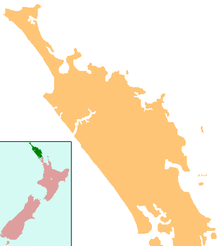| Battle of Puketutu | |||||||
|---|---|---|---|---|---|---|---|
| Part of the Flagstaff War | |||||||
 A print of the Battle of Puketutu; Heke's pā is at left centre, while the British assault parties are battling Kawiti's warriors in the distance to the right | |||||||
| |||||||
| Belligerents | |||||||
| Māori | |||||||
| Commanders and leaders | |||||||
|
William Hulme George Johnson Tāmati Wāka Nene |
Hōne Heke Te Ruki Kawiti | ||||||
| Units involved | |||||||
Allied Māori
|
Māori
| ||||||
| Strength | |||||||
|
British Army
Royal Navy
Allied Māori
|
Māori
| ||||||
| Casualties and losses | |||||||
|
13 killed 30–40 wounded |
30 killed 50 wounded | ||||||
Site of the Battle of Puketutu | |||||||
The Battle of Puketutu (Māori: Puketutu) was an engagement that took place on 8 May 1845 between British forces, under the command of Lieutenant Colonel William Hulme, and Māori warriors, led by Hōne Heke and Te Ruki Kawiti, during the Flagstaff War in the Bay of Islands region of New Zealand.
After Heke and Kawiti's sacking of the Bay of Islands town of Kororāreka in March 1845, the opening act of the Flagstaff War, the British retaliated with a punitive expedition to the area. After destroying the pā (hillfort) of a local chief at nearby Otuihu on 30 April, the British moved inland, led by a Māori ally, Tāmati Wāka Nene. They planned to attack Heke's pā at Puketutu, reaching the area on 7 May after a difficult march through dense bush. The battle commenced on the morning of 8 May, with three parties of British soldiers and sailors advancing to an area behind the pā whereupon they were ambushed by Kawiti's warriors. For the next few hours, there were repeated sallies back and forth until the British retreated, leaving Heke in command of the battlefield. He subsequently abandoned the pā. The Battle of Puketutu, the first attack mounted by the British on an inland pā, is regarded as a victory for Heke and Kawiti although at the time the British declared that the Māori had been defeated by virtue of exaggerated claims of the number of their warriors that had been killed in the engagement.
